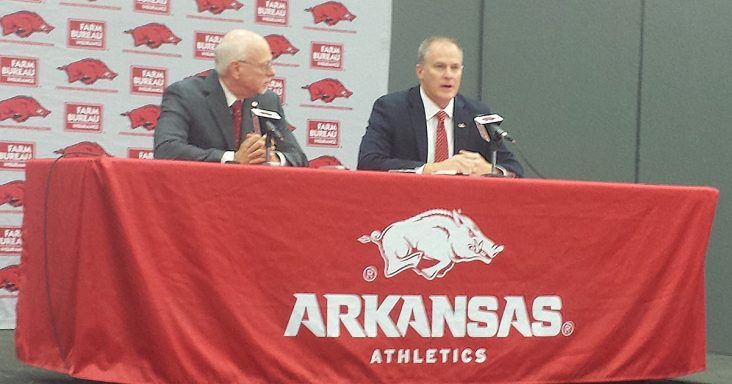New Arkansas AD: ‘Get a handle’ on coaching contracts and buyouts
by December 6, 2017 12:10 pm 2,157 views

University of Arkansas Chancellor Joseph Steinmetz (let) and athletics director Hunter Yurachek met the media Wednesday morning in Fayetteville
The University of Arkansas’ new athletics director said Wednesday (Dec. 6) college administrators need to get a handle on the escalating value of coaching contracts, and the associated buyout clauses that go with them.
Hunter Yurachek, who was named Jeff Long’s replacement on Monday, was introduced to the media and other UA supporters by Chancellor Joseph Steinmetz inside the Fowler Family Baseball & Track Indoor Training Center on the UA campus in Fayetteville.
In response to a question from Talk Business & Politics, Yurachek said the protection coaches are provided with in their contracts is getting out of hand.
“To me, losing football games is [reason for being] terminated with cause,” he said. “And the protection that coaches are provided with in their contracts to me is ludicrous. I want to be a leader in the industry and how we write our coaches’ contracts moving forward, so that there’s not 100% guaranteed [salary] protection for their contracts.”
There are numerous examples, but Yurachek made particular reference to former Texas A&M head football coach Kevin Sumlin, who was fired after six years and a 51-26 record.
Because of a raise and contract extension awarded to him in 2013, Sumlin will still be paid the $10.4 million he would have been paid if he hadn’t been fired by the university, according to his employment contract.
“Coaches deserve some protection,” Yurachek said Wednesday. “The expectations they face are so high, especially in our league and in other Power 5 leagues. But for Kevin Sumlin to get paid 100% of his contract at $10 million, I think that was a mistake. Now, I’m not at Texas A&M and I know we compete against them in our conference and they’ll probably hold that against me, but that is a mistake in our industry.”
Big payouts — and even bigger contracts — are becoming the norm in college athletics, particularly football. Sumlin’s replacement at Texas A&M, Jimbo Fisher, signed a 10-year, $75 million contract. The value of the contract, according to the university, is guaranteed.
Todd Graham was fired after his sixth season at Arizona State University, and the school is paying him a buyout of $12.3 million to not coach the Sun Devils. The money is guaranteed, even if Graham finds a new job.
ESPN has reported that former Arkansas coach Bret Bielema’s buyout for the final three years of his contract will be $11.8 million, a negotiated amount in between the $6 million the board of trustees wanted to pay, and the full contractual amount of $15.4 million argued by Bielema’s attorney, according to the report.
In February 2015, after Arkansas finished the 2014 season with a 7-6 record, including a 31-7 victory over Texas in the AdvoCare V100 Texas Bowl, Jeff Long announced the UA had signed Bielema to a two-year contract extension through December 2020. As part of the extension, Bielema received a salary increase up to $4.0 million in 2015, with $100,000 increases in each subsequent year. His average annual compensation in the new six-year deal was $4.25 million.
Yurachek’s first priority is, of course, negotiating a contract for a new head football coach at the UA. SMU head coach Chad Morris was named to the position on Wednesday. According to a copy of the employment agreement obtained by Talk Business & Politics, Morris’ buyout would be $14.7 million should the UA decide to fire him at any time before Dec. 31, 2018. The amount drops incrementally through the following five years, from $12.25 million in 2019, to $3.5 million in 2023.
Yurachek, who spent two years at Vanderbilt University nearly 20 years ago, said the Southeastern Conference is totally different today than it was then, and to an extent, so is the college athletics landscape. That has to do with a combination of conference revenue from bowl games, NCAA Tournament payouts and television deals.
He said the growth of the coaching salaries and contracts is “not a sustainable model” moving forward.
“Think of all the growth of the past 20 years, then think [what it will look like] 20 years from now,” he said.
USA Today reported in February that the SEC had generated nearly $650 million revenue in the 2016 fiscal year. Distributions to each of the league’s 14 members schools ranged from $41.9 million to $39.1 million.
